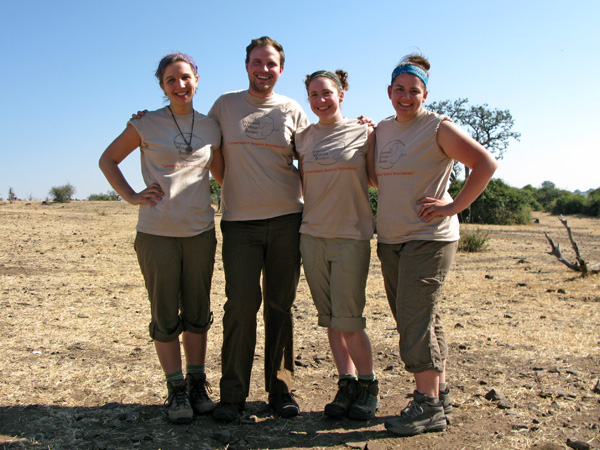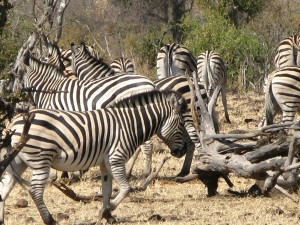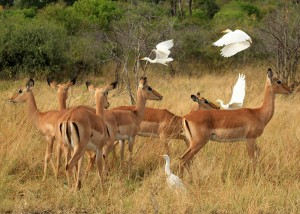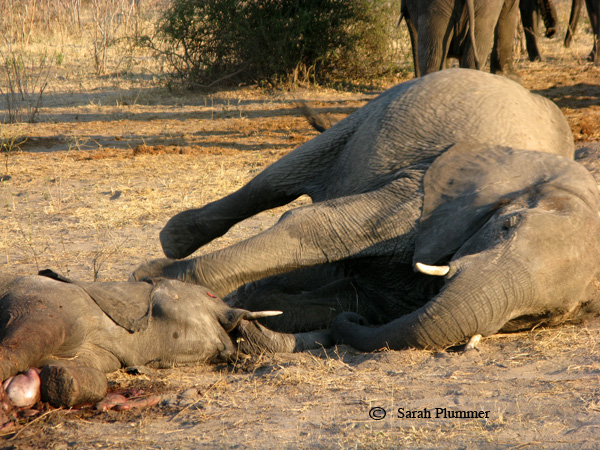EWB & University of Puget Sound, Field School Expedition
In April, Dr. Mike Chase and Kelly Landen were honored to be hosted at the University of Puget Sound in Washington State, as Conservation Practitioners-In-Residence, visiting classes, meeting with faculty and students, and giving public presentations.
Some of the evening events included a presentation of EWB’s most recent aerial survey of Botswana’s wildlife and discuss its implications for conservation and another evening, the documentary film by the BBC & Afriscreen, Elephants Without Borders, followed by a question and answer discussion. Presentations about EWB’s work were given in classes such as: Animal Behavior; People, politics and parks; Environment and Society; Biodiversity; and, Environmental Decision-Making. Also, students who are interested in conservation work had the opportunity to meet and talk with us on campus. As a continuation of this relationship and as part of the University of Puget Sound’s programs, they encourage students to have opportunities for educational experiences abroad. Thus, this month four students from the university, accompanied by Prof. Rachel DeMotts visited EWB at their base in Kasane. Below is a blog they have written to share with everyone about their experience with us:
Field School Blog Post; May 25, 2012
It was our third day in Chobe National Park. As we drove through the park to our final study area, we were excited because we finally felt confident in our ability to identify and count large herbivore species; however, we were caught by surprise when we saw a herd of over three hundred zebra grazing in the hills alongside the Chobe River. At this point we had spent the last two days in the park identifying, counting, sexing, and GPS marking the animals along the waterfront, but this was our first experience with zebras. You’d be surprised by how well their black and white stripes work as camouflage to blend in both with each other and with the environment!
Our work with Kelly Landen and Mike Chase of Elephants Without Borders (EWB) has been focused on counting not only elephant herds and the occasional surprise zebra herd, but also a variety of other indigenous animals including giraffe, impala, hippos, and kudu, among many others. This ground count is significant because it will be used to compare to wildlife counts from recent aerial surveys that EWB has been working on, providing for a more accurate picture of the wildlife in the area. The four of us are here as a part of Professor Rachel DeMotts’s Field School in Conservation and Development associated with the University of Puget Sound’s Environmental Policy and Decision Making Department. This is only the second year this opportunity has been offered and the first year that the Field School will be credited by our university. Though we are only four students, there are a variety of diverse academic backgrounds represented in our group, which makes for interesting and challenging field work and serves to broaden our horizons as we are exposed to new fields of study. In addition to our time in Kasane helping EWB, we’ve been traveling throughout Northern Botswana and will continue on into the Caprivi Strip of Namibia to gain complementary first-hand experiences to the topics we have studied this past semester, including impacts of tourism and conservation on local communities.
Our time in Botswana, and especially in Chobe, has demonstrated the significance that manifests from really being present and participating in things we had previously only read about in articles and scientific journals. The respect for raw beauty and power that was demanded by the wildlife at Chobe National Park caught many of us off-guard, and we now feel as though we truly understand the difficulty and experience necessary in fully capturing images of the wildlife through pictures, films, and other media. One experience that was especially meaningful for us occurred on the third day of counting. As we were driving out of the park we came across a huge group of elephants. Though the group was abnormally large, what stopped us in our tracks was a young, dead elephant on the side of the road. Kelly, our elephant expert guide, explained that the mother of the elephant was mourning her lost offspring. As we sat and observed, the mother ceaselessly tried to wake her 3 to 4 year old child, and even lay down next to it, continually nudging its tusks and head to no avail. The other elephants in the family group watched and fended off vultures from the carcass, clearly demonstrating their respect for the mourning elephant mother. Other elephant families also passed through and paid their respects. Watching this heartbreaking event, we became cognizant of the expressiveness of which these animals are capable. Certainly it has had an enormous influence on us all and generated a realization of just how powerful these personal experiences can be.
We’d like to thank Elephants Without Borders, Rachel DeMotts, and the University of Puget Sound for this unbelievable opportunity! This experience has demonstrated the power of animals and the complexity of conservation efforts, and we are thankful to have had such knowledgeable people help us along the way. We are looking forward to heading into the Caprivi Strip next week to continue our exploration of conservation and development.
Katy Papoulias, Jason Rison, Sarah Plummer, and Lindsey Coulson
To help support EWB’s conservation programs, visit: http://www.elephantswithoutborders.org/donate.php
- Thank you Univ. of Puget Sound, Prof. DeMotts and EWB for an experience of a lifetime!
Tags: africa, botswana, chobe, conservation, education, elephants, elephants without borders, research, survey, wildlife










